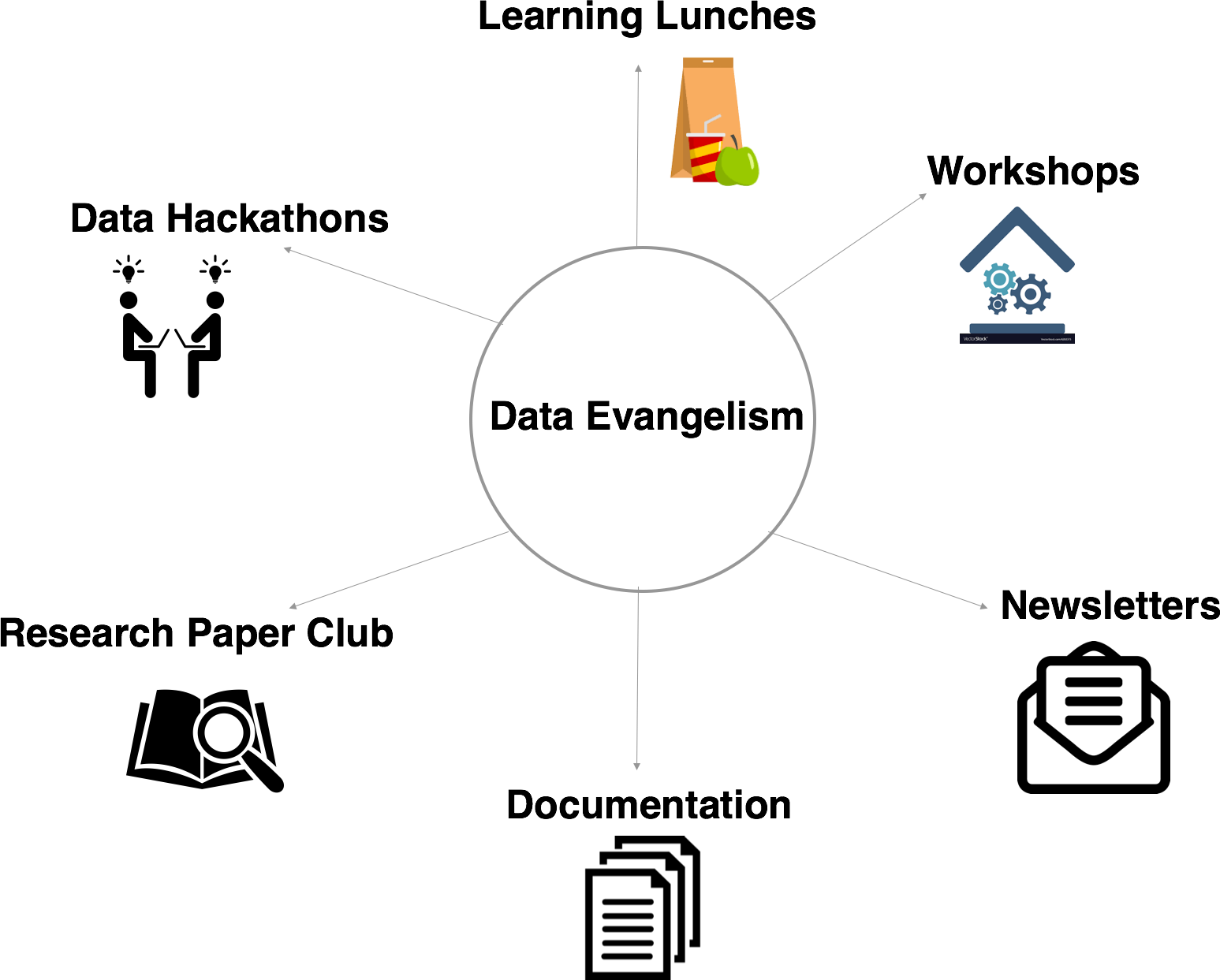
When is the last time you helped someone with a request that they could’ve easily done themselves? If you’re like most data scientists, you’re likely having to deal with ad hoc requests on a fairly frequent basis.
The easiest way to minimize the number of these requests is to educate and empower your colleagues through data evangelism efforts. Every organization is different and depending on which stage of the Data Maturity Model your company is in, one data evangelism initiative may have a higher return on investment than others. For example, if you’re getting variations of a simple SQL request (E.g. what are sales in region x during these days?), then creating a SQL workshop may prove to be a great use of your time.
Besides making your colleagues self sufficient, data evangelism can also lead to strengthening your technical team and promote awareness of your work. Inviting people to share their work in the context of a learning lunch or a newsletter, is a great way to raise awareness and allows for people to showcase their knowledge. External stakeholders may also benefit from greater insight into what exactly the data science team does, and how they can help them achieve their business objectives.
As a data scientist, you should be leading the way when it comes to evangelizing your data and encouraging data-driven decision making. With the importance of data evangelism in mind, below are six ideas for initiatives that you can start at your company.
1. Workshops
If you find yourself regularly dealing with simple requests that can be done with some basic training, then it may be time to consider hosting a workshop. Educating line of business stakeholders on the basics of SQL and the mechanics of your data collection and storage may lead to huge time savings on your part. Other topics could include an overview of basic business intelligence tools such as Periscope and Tableau, or even a workshop describing the basics of how your predictive models make decisions. The key here is to engage, educate and inspire your colleagues to continue learning on their own. Having office hours during specific times of the week may be another useful way to keep engagement high and create time to answer questions. This way you can also batch questions, and avoid context switching during the week.
2. Newsletter
With a newsletter, you can either focus on internal topics (highlighting projects and internal team updates), external (industry trends), or a hybrid of the two. Having a way to communicate what your team is working on is a great way to raise awareness and coordinate action with others in your company. Similarly, highlighting developments in your field may lead to someone outside of your immediate team to come up with a novel idea worth exploring.
3. Research Paper Club
When you start working it can be difficult to continue learning and staying on top of the latest developments. In this way, research paper clubs can serve as a useful accountability tool. It may also lead to some interesting ideas that impact your technical roadmap.
4. Learning Lunches
Inviting internal or external speakers is a great way to get a fresh perspective and offer a platform for others to share what they’re working on. The goal could be anything from highlighting unique insights from people outside of your team, to generating interesting discussions.
5. Data Hackathons
Opening your data to others in your company can be useful if you want to brainstorm new ways to visualize data or different approaches to building predictive models. Sometimes it takes someone who doesn’t look at the same data every day to come up with a novel insight.
6. Documentation
An important step in educating your colleagues is creating documentation on topics that come up frequently. This will also be an invaluable tool when on-boarding new teammates.
A culture which educates and empowers employees through data evangelism efforts will be one that will reap both explicit and implicit benefits for many years to come. Sometimes it’s as simple as walking through a business stakeholder through the mechanics of a model you have in production to get them to understand how it’s happening, as opposed to having them to think it’s black-box magic. With increased transparency, that business stakeholder may be more likely to cooperate and may even come up with some new applications that you hadn’t thought of before. These types of efforts among the ones listed above will ultimately lead to increased credibility and trust. Without these two things, no matter how great your technical abilities are, your ability to impact the company will be stunted.
If you have other ideas for data evangelism efforts, please share in the comments below!